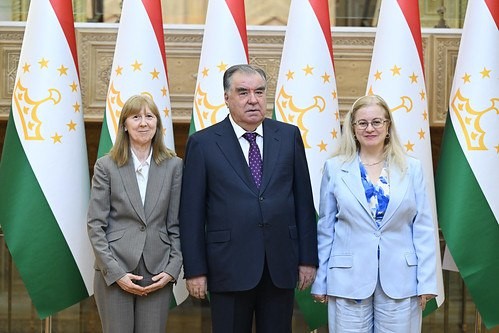Fueling Growth: IFC Strategic Initiatives for Sustainable Development in Central Asia – An Interview With Hela Cheikhrouhou
With its headquarters in Washington, D.C. the International Finance Corporation (IFC) was established in 1956 as the private-sector arm of the World Bank. The institution offers advisory, and asset-management services to promote investment in developing countries. Recent ventures in Central Asia include solar power projects in Uzbekistan and Kyrgyzstan, and an entrepreneurship scheme for women and young people in Tajikistan. TCA spoke with Hela Cheikhrouhou, IFC Vice President for the Middle East, Central Asia, Türkiye, Afghanistan, and Pakistan about the IFC’s work in Central Asia. TCA: Can you please give us an overview of IFC's performance in Central Asia for fiscal year 2024 (July 1, 2023, to June 30, 2024)? IFC had a pivotal year in Central Asia, making strides in sustainable development and inclusive growth across the region. Our efforts concentrated on climate finance, infrastructure, agriculture, and supporting smaller businesses. By coupling investments with advisory support, we helped expand the role of the private sector, creating jobs, promoting financial inclusion, strengthening infrastructure, and supporting the region's green transition. In the fiscal year 2024, IFC committed over $1 billion to Central Asia. This includes about $400 million in long-term financing from our own account, $600 million in mobilization, and $35 million in short-term trade and supply-chain finance to facilitate trade flows. Alongside these financial commitments, we engaged in advisory projects focused on improving financial inclusion, developing innovative public-private partnerships (PPPs), and advancing climate initiatives and gender equality. Our results this year underscore our commitment to fostering sustainable, inclusive growth, and enhancing the resilience and sustainability of Central Asian economies. TCA: Can you highlight some of the IFC’s key achievements in Central Asia this year? In addition to the strong financial commitments mentioned earlier, IFC expanded its presence in various sectors, including finance, capital markets, renewable energy, agriculture, and infrastructure. Through our advisory services, we helped structure impactful PPPs at the sectoral level. A major focus this year has been strengthening local financial markets. IFC invested $228 million across ten financial institutions in Kazakhstan, the Kyrgyz Republic, Tajikistan, and Uzbekistan. Up to half this amount was dedicated to supporting women entrepreneurs and rural enterprises. We also helped these financial institutions expand portfolios related to their micro, small, and medium enterprise (MSME) businesses, advance climate finance, foster digital transformation, and issue the region’s first sustainability, social, and green bonds. Supporting MSMEs has enabled entrepreneurs to grow their businesses and generate employment. In the past fiscal year alone, IFC-supported projects created around 35,000 direct jobs, including opportunities for over 13,000 women across the region. These efforts have been further bolstered by targeted investments and projects in individual countries across the region. In Uzbekistan, IFC, together with the World Bank, financed a new solar plant equipped with the country’s first battery energy storage system. Once completed, the plant is expected to provide electricity access to around 75,000 households in the Bukhara region. As part of its broader support for the Uzbek government’s efforts to reform its chemical sector, IFC assisted the State Asset Management Agency in privatizing Ferganaazot,...


